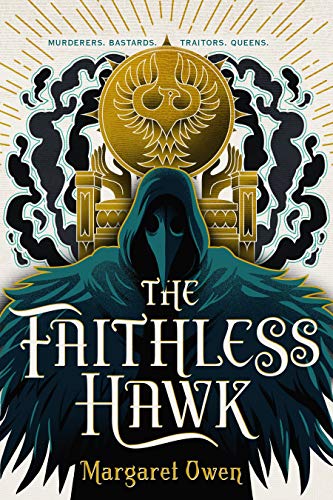The Merciful Crow was one of my favorite debuts—favorite books, period—of 2019, and I’m overjoyed to find that the conclusion of Fie’s saga, The Faithless Hawk, is as original, emotional, dramatic, and insightful as her introduction.

Fie has, against all odds, gotten Prince Jasimir and his bodyguard Tavin to safety. They are protected by an entire army and fierce magics, and are on their way to claim Jasimir’s throne from his conniving stepmother. This will, they hope, usher in a new era of peace. Although Fie misses her friend Jasimir and her lover Tavin, she’s satisfied with her accomplishments. After all, hasn’t she fulfilled her oath? Hasn’t the world become a safer place for her band and the entire Crow caste?
Of course not. Ingrained systematic oppression doesn’t end with a single good ruler, and also, Fie’s life has never been easy, so why would it start to be now? The Faithless Hawk does the bold and admirable job of burning through plotlines that might take other books, well, entire books to get through. Not so here. By a third of the way through, every plot line I thought I might see at the conclusion had already happened. Not since The Good Place ended have I seen a writer so committed to making her characters deal with all of their illusions and dependencies in such relentless succession. Fie’s advantages disappear one by one, until she’s alone again in a strange place, with only a few dubious allies between her and a whole horde of people who want her dead and gone.
Who want her entire people and way of life dead and gone.
The book pulls no punches when it comes to revealing the cruelty and violence people commit when they think there are no consequences, and also the weight that mercy and self-defense impose on the people trying to do the right thing. There is a lot of death, and a lot of blood. It’s shocking but not salacious. Owen doesn’t want gore for gore’s sake; she’s investing the world with the weight of all that blood, not just its colorful spurt.
The Faithless Hawk is timely in more ways than one. Not only is there political unrest and abuse of the vulnerable, there’s also a plague. A plague that officials try to hide and downplay rather than face, which leads to thousands of unnecessary deaths. It’s an eerily prescient book. (Also: is Margaret Owen psychic?)
In particular, I love the scene in which Rhusana complains to Fie about how hard her life has been, all while draped in a white gown studded with diamonds, attended by a deadly white tiger, and actively threatening Fie. It’s a perfect encapsulation of toxic whiteness. The absolute obliviousness and gall of her complaint would be laughable if it weren’t so tragically true to life.
But like all good villains, she does have a point. The caste system is unfair, and the relegation of yet another group of people—the Swans—to providing entertainment and pleasure (aka sexual slavery for at least some) is abhorrent. Rhusana’s life has been hard. But she chooses to make others’ lives even harder, and punches down when she should be punching up. Her failure to understand the real source of her own suffering, and to trade personal safety for the lives and livelihoods of thousands of others…yeah, did I say this book was prescient?
My only criticism is that I’m not wholly convinced by the central…let’s call it interpersonal conflict to avoid spoilers if we can. I also don’t love how readily others accept the…interpersonal conflict. Partly that’s because Owen’s character work is very good, and certain decisions don’t seem entirely in keeping with established personalities. But it’s also slightly forced, and I’m not wholly convinced all the extent or duration of the subterfuge was entirely necessary.
However, it does make for a lovely exchange about the price of heroism. Fie insists that self-sacrifice need not be self-abnegation; that success built on even one person’s denial of who they are is not a true success. It’s part of a larger conversation Owen is having about the price of power, and who ends up paying it, and I like that she takes time to insist that those who fight for justice may indeed be costly, but that they should never concede that the cost must necessarily be so total. The whole point, after all, is not for the downtrodden to suffer more, but for justice to be levied on those who benefit from that suffering. Fie’s tenacity in righting the wrongs of the past—even when some of those are her own wrongs—make this a strong meditation on how we can think through—and beyond—our birthrights. This is a fitting end to Fie’s story, but I hope it’s not the last we see of this world. I know it won’t be the last I read of Margaret Owen. I already can’t wait for whatever she does next.
The Faithless Hawk will be released August 18th.
